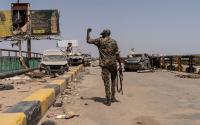In August, 2004, the Pew polling agency released a poll, co-sponsored by the Council on Foreign Relations (CFR), about attitudes of U.S. voters on current world affairs issues. They discovered an unusually high degree of concern about world issues (as compared say to economic issues). But even more important, they found considerable difference in attitudes between Bush and Kerry supporters. Specifically, the Bush supporters are twice as likely to feel that the U.S. is stronger than it was ten years ago. And asked if the U.S. is less respected in the world than previously, Bush supporters are slightly less likely to think so. But more significantly, only 22% of them think world respect is a major issue, whereas 56% of Kerry supporters rate its decline as a major problem.
The CFR published a commentary on the poll by three of its Fellows - Lee Feinstein, James M. Lindsay, and Max Boot. Here is their analysis:
These disparities suggest something deeper than divisions over the Iraq war are at work. Bush supporters and Kerry supporters are taking sides in the longstanding debate over the relative importance of "hard" versus "soft" power. Will the U.S. be safer and more prosperous if it is feared, or if it is loved? Are America's military strength, and the willingness to use it, what count most, or is America's reputation abroad equally important? <http://www.cfr.org./publication.php?id=7259>
I believe that this commentary is correct, but it evades an important analytic question, which seems to have escaped the attention of the three CFR Fellows, and probably of the large bulk of the American population.
Suppose the United States is neither feared nor loved? Is this credible? And if so, what are the implications of such a view of the U.S. by people elsewhere for war and peace, geopolitical realignments, and the U.S. view of itself in the decades to come?
Let us look at both fear and love.
When one talks of the U.S. being feared, one is referring to fear of the overwhelming military hardware the U.S. possesses, and the technological expertise and financial backing that it reflects. It is quite clear that, as of now and probably for some time to come, no other country could declare war on the United States and hope to win. And for that reason, I do not see the slightest hint of any country thinking about declaring war on the United States. But old-fashioned interstate war between great powers is not the issue at the present time.
The issue is whether U.S. military power is adequate to maintain order in every corner of the world in which activities are going on of which the U.S. government disapproves. Is the U.S. capable of "preempting" what it considers to be threats by dangerous regimes, or what it considers to be threats by non-state actors it labels "terrorists"? Does Iran "fear" the United States? Does al-Qaeda fear the United States?
Well of course both Iran and al-Qaeda (quite different kinds of actors) know that the U.S. can and probably will engage in multiple hostile actions towards them. And tactically, they may decide from time to time that it is wiser not to provoke what they may perceive to be an aggressive bear. But does that mean they really fear the United States? To fear the United States implies that they will change their basic strategy (not their interim tactics) because they might be crushed by the United States if they did not. Is there any evidence that this might be true?
After three years of a "war on terror" and almost 18 months of occupying Iraq, is the U.S. actually more "feared" than it was previously? I cannot see myself how reasonable persons, whatever their political views, could defend that proposition. The Bush unilateralist military machismo has been exposing the limits of U.S. military power, not its efficacity. The U.S. is faced with an ever-widening and fiercer insurrection in Iraq, a weakening of its political position throughout the Middle East, and an increasing reluctance of Americans to pay the ever-increasing price in lives and money for this non-victory. The Iraq adventure is far more likely to end in humiliating withdrawal than in the triumphant spread of pro-Western "democracy" in Iraq and the wider Middle East.
But what about the alternative - to be "loved"? The United States used to be loved, at least by one-half of the people of the world. I have heard many a speech, public and private, on the historic and present-day importance of the role of the United States in the world - as exemplar and defender of human freedom, without whom the world would be far worse off than it is. So I know these people are out there - or were out there. What, however, has been happening in the last three years, for a good number of these people, is a public avowal of unhappy disillusionment, an almost pleading wish that the Bush fiasco hadn't revealed so plainly to them the down side of U.S. foreign policy.
These people want urgently that the U.S. put another foot forward again, the one they think they used to know. That is why so many of them speak so openly of hoping that Kerry will win the elections. But at the very same time, they also add that somehow it can never be the same again. Kerry will be better than Bush, they think, but will this be enough to transform the world situation, and their view of the world situation? Will the U.S. be "loved" - again? For that to happen, they have to wipe out the memory not only of the Iraq invasion, but of Abu Ghraib, of Guanatanamo Bay, of the Patriot Act - whose appalling consequences many of these foreign philo-Americans have felt personally when they sought visas or tried to enter the U.S.
Mao Zedong said famously that the U.S. is a paper tiger. He may have been ahead of his time. It may not have been true when he said it. But what if it is becoming true now? The consequences of this for both the world and the United States are completely uncertain. In terms of geopolitics, it may be creating a momentary vacuum into which all sorts of players will rush, with very uncertain results. And for the United States, it may lead to endless and futile arguments between the devotees of hard and soft power about who is to blame, when what is needed within the United States is a total reassessment of how it relates to a world it no longer is in a position to dominate either by fear or by love - for good or ill.






